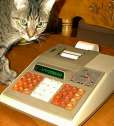Hewlett-Packard HP-42S
| Datasheet legend
Ab/c:
Fractions calculation
AC: Alternating current BaseN: Number base calculations Card: Magnetic card storage Cmem: Continuous memory Cond: Conditional execution Const: Scientific constants Cplx: Complex number arithmetic DC: Direct current Eqlib: Equation library Exp: Exponential/log functions Fin: Financial functions Grph: Graphing capability Hyp: Hyperbolic functions Ind: Indirect addressing Intg: Numerical integration Jump: Unconditional jump (GOTO) Lbl: Program labels LCD: Liquid Crystal Display LED: Light-Emitting Diode Li-ion: Li-ion rechargeable battery Lreg: Linear regression (2-var. stats) mA: Milliamperes of current Mtrx: Matrix support NiCd: Nickel-Cadmium recharg. batt. NiMH: Nickel-metal-hydrite rech. batt. Prnt: Printer RTC: Real-time clock Sdev: Standard deviation (1-var. stats) Solv: Equation solver Subr: Subroutine call capability Symb: Symbolic computing Tape: Magnetic tape storage Trig: Trigonometric functions Units: Unit conversions VAC: Volts AC VDC: Volts DC |
| ||||||||||||||||||||||||||||||||||||||||||||||||||||||||
 The HP-42S is considered by many one of the best calculators made by Hewlett-Packard. The trouble is, the HP-42S is no longer manufactured. Given the price used HP-42S machines fetch when sold privately, it's difficult to see why.
The HP-42S is considered by many one of the best calculators made by Hewlett-Packard. The trouble is, the HP-42S is no longer manufactured. Given the price used HP-42S machines fetch when sold privately, it's difficult to see why.
The HP-42S was perhaps the first Hewlett-Packard calculator that provided integrated support for different data types. The stack, as well as storage registers, could store real and complex variables, matrices, and text strings. Support was nearly complete; for instance, logarithmic, exponential, and trigonometric functions were all capable of operating on a complex argument, or yielding a complex result.
The HP-42S, meant as a successor to the highly successful HP-41 line of calculators, was highly compatible with HP-41 programs. The machine lacked the HP-41's expansion ports, but it had more memory and an infrared port for printing.
The HP-42S (and, to a lesser extent, the HP-41) are also examples of calculators with a keystroke programming "language" that's beginning to closely resemble "real" programming languages. Indeed, when you use an HP-42S and an HP-48SX side by side, you can see how the line is becoming blurred. Often, the same keystrokes produce a "keystroke macro" on the HP-42S and a highly sophisticated object-oriented program on the HP-48SX.
Finding a Gamma function implementation among the 600-odd functions of this calculator is not exactly a great surprise. As it happens, this built-in Gamma function evaluates only for real arguments, giving me the opportunity to create another example: a Gamma function program that can be used with complex arguments as well:
00 { 244-Byte Prgm }
01 LBL "GAMMA"
02 0
03 ENTER
04 0
05 COMPLEX
06 +
07 1
08 X<>Y
09 LBL 02
10 ENTER
11 COMPLEX
12 R↓
13 X>0?
14 GTO 01
15 R↓
16 ENTER
17 R↓
18 ×
19 R↑
20 1
21 +
22 GTO 02
23 LBL 01
24 R↓
25 STO "X"
26 X<>Y
27 STO "G"
28 76.1800917295
29 RCL "X"
30 1
31 +
32 ÷
33 86.5053203294
34 RCL "X"
35 2
36 +
37 ÷
38 -
39 24.0140982408
40 RCL "X"
41 3
42 +
43 ÷
44 +
45 1.23173957245
46 RCL "X"
47 4
48 +
49 ÷
50 -
51 1.20865097387E-3
52 RCL "X"
53 5
54 +
55 ÷
56 +
57 5.39523938495E-6
58 RCL "X"
59 6
60 +
61 ÷
62 -
63 1.00000000019
64 +
65 PI
66 2
67 ×
68 SQRT
69 ×
70 RCL "X"
71 ÷
72 LN
73 RCL "X"
74 5.5
75 +
76 LN
77 RCL "X"
78 0.5
79 +
80 ×
81 +
82 RCL "X"
83 -
84 5.5
85 -
86 E^x
87 RCL "G"
88 ÷
89 RTN
90 .END.


